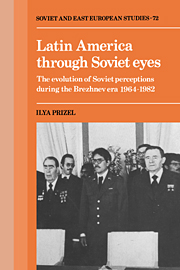 Latin America through Soviet Eyes
Latin America through Soviet Eyes Although most of Latin America attained formal independence in the early nineteenth century, and in fact most of the region's states predate many European states, Latin America played only a peripheral role in the world arena. The center of the arena was Europe, geographically distant from Latin America. When British policy severely limited European influence in the Americas (and enabled President Monroe to develop the so-called Monroe Doctrine), Latin America's global political role became further marginalized. After the end of World War II, as Britain, Germany, and France withdrew from the Latin American scene, the area fell almost entirely into the US sphere of influence.
Given the preponderant US domination of both Latin America and the OAS, it is hardly surprising that the USSR retained a contemptuous attitude toward the hemisphere. For years the prevailing Soviet perception had been that Latin America, although nominally politically independent, in reality was little more than an adjunct to various colonial powers. Stalin and Molotov often described the region's states as “US satellites” or “pseudo-colonies of the US.”
This attitude continued well into the Brezhnev era, unmodified until the late 1960s. Latin America was not included in changing Soviet perceptions of the Third World after Stalin's death, when Soviet analysts conceded that newly independent states governed by the bourgeoisie were not necessarily stooges of imperialism. Khrushchev recognized that such states as Egypt and India were indeed capable of severing their ties with their imperialist patrons.
To save this book to your Kindle, first ensure [email protected] is added to your Approved Personal Document E-mail List under your Personal Document Settings on the Manage Your Content and Devices page of your Amazon account. Then enter the ‘name’ part of your Kindle email address below. Find out more about saving to your Kindle.
Note you can select to save to either the @free.kindle.com or @kindle.com variations. ‘@free.kindle.com’ emails are free but can only be saved to your device when it is connected to wi-fi. ‘@kindle.com’ emails can be delivered even when you are not connected to wi-fi, but note that service fees apply.
Find out more about the Kindle Personal Document Service.
To save content items to your account, please confirm that you agree to abide by our usage policies. If this is the first time you use this feature, you will be asked to authorise Cambridge Core to connect with your account. Find out more about saving content to Dropbox.
To save content items to your account, please confirm that you agree to abide by our usage policies. If this is the first time you use this feature, you will be asked to authorise Cambridge Core to connect with your account. Find out more about saving content to Google Drive.